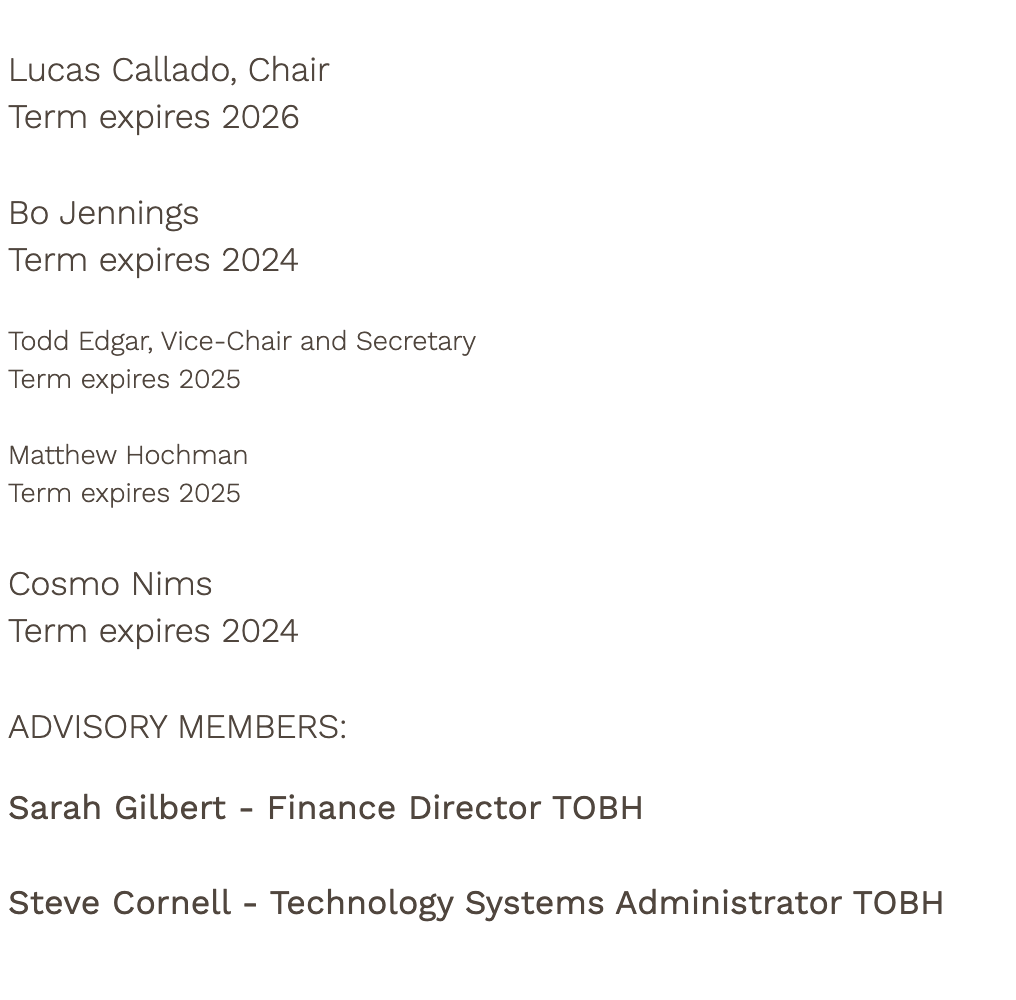Martinez Wants to Make Sure Community Feedback Helps Potential Rural Employee Housing Land Use Changes Reflect Reality
Dark Fiber Still Coming, Jennings Hopes for More Talks on Mass Messaging System
BAR HARBOR— Sometimes it’s hard insuring that town land use ordinance changes reflect the reality of the needs of businesses or residents. And when it comes to potential changes to employee living quarters and shared accommodations in some of Bar Harbor’s rural districts, Bar Harbor Staff Planner Cali Martinez hopes to do that.
Her first step on the quest is to gather more survey responses from rural businesses in Bar Harbor and to study the responses to make sure that any changes to the rules about those housing types allowed reflect the need and uses of those businesses.
The survey focuses on employee housing needs for rural employers. For Martinez, a College of the Atlantic graduate who started at the Planning Department this year after working on several town committees and boards, community feedback is important to create good local land use regulations. That’s because land use regulations impact a community.
“I want to make sure the proposed amendment matches the reality of the rural businesses,” she said of potential changes.
The survey marks the beginning of the community engagement process for this potential land use amendment, she said. “At this point in the community engagement process, the feedback from the survey is meant to inform us if we need to alter some standards before we bring the draft land use amendment for feedback from the general public.”
The survey is open until September 11. Martinez has received only a few responses so far despite posts on social media, the town’s website, mentions in news articles, and direct emails.
BACKGROUND AND WHAT THE CHANGES MIGHT BE
At a February 3 Planning Board meeting, Glenon Friedmann, representing Bar Harbor Farm at 115 Gilbert Farm Road in the Town Hill rural district, said that one of the farm’s biggest challenges is employee housing. The farm originally had a plan that had a few cabins for workers, but it couldn’t build the cabins and get a permit because it wasn’t an allowed use in that district, she said. Friedmann asked that farm employee housing be added as an allowed use in the zone.
Bar Harbor Planning Director Michele Gagnon had said that the planning staff has been talking about expanding the district where that was allowed. Or a similar use could potentially be added to the Town Hill Rural district.
“Employee housing is needed for more than restaurants and downtown shops,” she said.
Currently employee living quarters and shared accommodations (explained in above images) are allowed in the downtown zones, but not in many (or any) of the rural areas.
The changes would allow them in some areas and might also tweak requirements for things like parking and size.
Martinez presented the work and discussion on those potential expansions at the Planning Board meeting, June 7.
THE NEED
To understand how to best address Friedmann’s request and to help facilitate housing for other employers who might have similar issues, Martinez needs as much information as possible.
“I’m sending out the word for feedback because (1) the planning board requested it, (2) to propose an amendment to better meet the needs of the rural business, and (3) to collect qualitative data to support the final draft language,” she said this week.
Martinez clarified what she means by “matches the reality of the rural business,”
“For example, since there is currently no parking required for ELQs, we could assume that a rural ELQ should have a minimum parking standard of one parking space per bedroom because each worker would likely need a car to get around. However, what if a few of these rural businesses provide company vehicles or a shuttle? What if their typical employees don’t own a car because they are local college students or VISA workers? In this case, one parking spot per occupant could be unnecessary; it could increase costs and create unnecessary impervious area.”
The draft amendment language will come forth for general public feedback before the end of the year, she said.
You can find that survey here: https://polco.us/sshcsm
Communications and Technology Committee
The Communications and Technology Committee met via Zoom on Monday, August 21, to elect officers and discus a fiber optic network update. The small, collegial committee made quick work of its tasks.
According to the town’s website, “The Communication and Technologies Committee was created December 19, 2019. It was formerly the Communications and Technology Task Force. The committee's mission is to develop or enhance the Town of Bar Harbor’s voice, data, and video communication systems for its department network, television channels (public, education, and government), internet web site, and other such evolving communication needs.”
Two former Town Council candidates were appointed to the all-male committee, Gary “Bo” Jennings and Cosmo Nims. Nims was absent. According to the town’s website, both men’s terms end in 2024. Chair Lucas Callado was also reappointed to the committee with a 2026 term end. Todd Edgar who had been serving as vice chair and secretary has a term that expires in 2025 as does Councilor Matthew Hochman.
The meeting was called to order at 4:03. The members quickly elected officers, returning Callado to chair, electing Jennings to vice chair, and Edgar to secretary. All passed unanimously and ran unopposed.
FIBER OPTIC NETWORK
According to Technology Systems Administrator Steve Cornell, the town’s fiber optic network is still moving forward.
“There’s plenty of roadblocks. It should have been done already,” Cornell said, “but we’ll figure it out.”
One of those major roadblocks, he said is that Homeland Security has specific requirements for trenching by the Bay Ferries Terminal and Cat.
The plan is “designed to interconnect all of the specified town-owned and operated locations.”
Hochman asked if the town had heard from Consolidated to bring Viridium to town. Cornell reached out to the representative on Thursday. They are doing the last little bits of connections, Cornell said. He doesn’t have the exact date, but thinks they are a year out from completion.
According to an October Town Council packet from former Bar Harbor Town Manager Kevin Sutherland,
“After several months of conversation, Consolidated Communications (CCI) will build out a leased network for the town (with connection to the Town of Mount Desert) for $372,329. This is substantially below the previously approved bond amount of up to $750,000, but it does come with a $114 monthly expense per drop location—totaling $2,850 a month for all sites.
“In addition, should the Council authorize us to move forward with this contract, CCI has agreed to partner with and assist the Town in applying for grant monies to further build out Fidium to the under/unserved parts of Bar Harbor.”
Fidium is Consolidated Communications’ fiber gigabit consumer broadband service.
First, the town’s contract leases a town network from Consolidated to connect up town facilities. It’s a dark fiber network to pass data between facilities and to the town of Mount Desert. The towns currently share several police department positions and a fire department position.
Broadband is internet access with a high-speed internet connection. There’s a minimum of 25 Mpbs download speed and 3 Mbps upload speed. It can be offered via fiber optics, cable, DSL, satellite, or wireless.
A dark fiber network is usually used in network and telecom communication. It can be set up from point-to-point or as multi-point and allows businesses or governments more control over the infrastructure of their networks, allowing secure and fast internet capabilities and movement of large amounts of data.
The town currently has a dark fiber network with Spectrum. That contract has expired. The new monthly cost would be $2,445 because the Town of Mount Desert will pay a small part of the fees. The library and schools would also be connected and pay for monthly fees as well. Internet access is outside of the private network, but the dark fiber network is controlled entirely by the town.
ADDITIONAL AGENDA ITEMS AND MASS MESSAGING SYSTEM
Jennings would like to add to the agenda, adding a mass notification texting program to get mass messages out to the people. Former Communications Coordinator, now Town Councilor Maya Caines, had advocated for and began to develop a system last December.
It has not been implemented with all the changes in staffing, Cornell said. He added that he only heard about it after the fact. Cornell said it might be on hold until a new communications coordinator is hired, which is something the last Town Council has said they don’t intend to do until there is a new permanent town manager and even then, some former councilors had said they’d like to reframe that position.
“It’s a massive project,” Cornell said of the mass messaging system.
Jennings said, “But it’s very important.”
Jennings worried about putting things off until a new manager is hired and then overwhelming the new town manager with so many large and small projects.
“Oh, they will be,” Hochman said.
LINKS TO LEARN MORE
To email the Communications and Technology Committee send to: ctc@barharbormaine.gov
https://www.barharbormaine.gov/368/Communication-Technologies
Could Employee Living Quarters and Shared Accommodations Expansion Help Ease Bar Harbor’s Housing Woes?
BAR HARBOR—According to studies created this year as part of the comprehensive planning process, Bar Harbor is going to need a lot of new dwellings by 2033 and it doesn’t have a lot of space to put them. At a February 3 Planning Board meeting, Glenon Friedmann, representing Bar Harbor Farm at 115 Gilbert Farm Road in the Town Hill rural district, said th…
New System Will Bring Mass Notifications To Bar Harbor
BAR HARBOR—Worried about missing information about moving your car parked on the street during winter plowing? Want to know before you get there if a road is closed because of trees on wires or a fire or police emergency? Maybe you’d like to know if a water main has burst downtown? Or maybe if both boilers have broken at Conners-Emerson and students are…













